June 2023 NextGen Leaders Security Delegation
June 19-23, 2023
The June 2023 Security Delegation of the U.S.-ROK Next Generation Leaders Program (NextGen) included eight rising Asia policy professionals from diverse backgrounds comprising security, foreign policy, defense, technology, and economic security. The delegation was led by Evans Revere (Albright Stonebridge Group), former deputy chief of mission and later chargé d’affaires at the U.S. Embassy in Seoul. The delegation met with various ROK and U.S. government agencies, academics, military officials, civil society actors, and foreign correspondents during a week-long trip in Seoul.
The participants first had a discussion with Lieutenant General (ret.) Chun In-bum, who shared insights on South Korea’s military affairs and the U.S.-ROK alliance. At the Office of the President, the delegates met Lim Sang-bum, the secretary to the president for national security strategy, and learned about the current security landscape in Northeast Asia, its implications for South Korea’s national security, and the country’s evolving role within the Indo-Pacific security architecture. Through a visit to the Ministry of National Defense, the delegates had an opportunity to gain a comprehensive understanding of South Korea’s defense policies from Lee Seung-buhm, the director general of the International Policy Bureau. Ambassador Ahn Ho-young, a former South Korean diplomat and a member NBR’s Board of Directors, also provided an overview of the ROK government’s foreign policy objectives and vision.
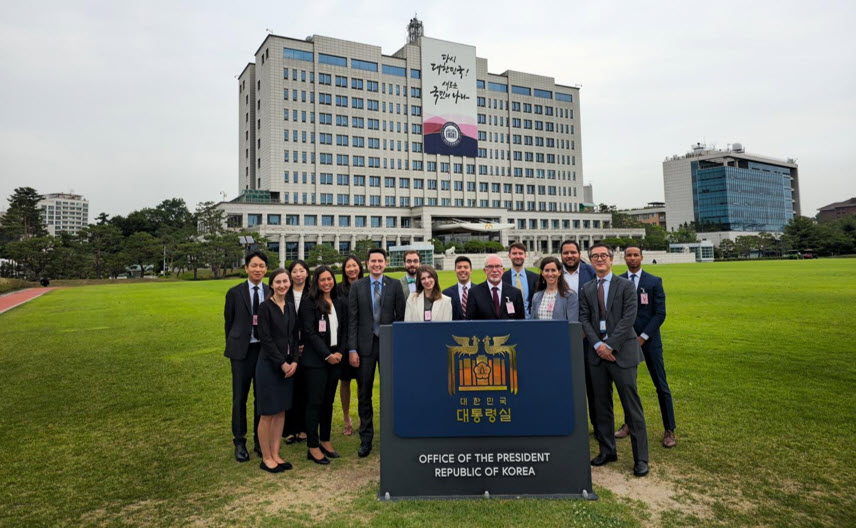
The NextGen delegation also visited the National Assembly and met with Assemblyman Tae Yong-ho, the first North Korean defector to become a member of the National Assembly. He provided his perspective on South Korea’s domestic politics as well as his journey to becoming a politician after his life in North Korea. Following a luncheon with the president of the Korea Foundation, Kim Gheewhan, the delegates visited the Ministry of Foreign Affairs to better understand South Korea’s foreign policy objectives, particularly focusing on its ambitions to become a global pivotal state. The delegation also met with the Ministry of Unification, where the director-general for strategy and director-general for unification policy briefed the delegates on the ministry’s goal of achieving peaceful unification. The participants learned about the ROK government’s intelligence system by vising the country’s chief intelligence agency, the National Intelligence Service.
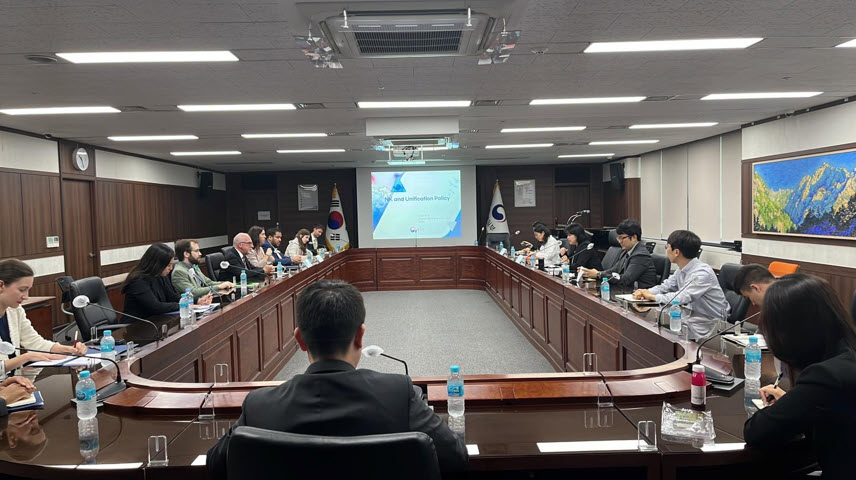
In addition to meeting with officials from ROK government agencies, the delegation met with U.S. government and military officials. The U.S. Embassy’s deputy chief of mission, Joy Sakurai, presented a country briefing as well as the history of U.S.-ROK relations. By visiting U.S. Forces Korea, the participants gained a better understanding of the role and mission of the U.S. forces presence and the U.S.-ROK alliance in keeping peace and stability in the region.
NextGen delegates also engaged with experts from academia, journalism, and human rights, among other areas. The group dined with academics from Taejae Future Consensus Institute, as well as former NextGen scholars, and discussed the most pressing issues in the region, ranging from nuclear deterrence to U.S.-ROK-Japan trilateral relations. They also met with foreign news correspondents from NK News, Reuters, the New York Times, and the Wall Street Journal. Through a briefing with North Korean defectors and human rights activists from Woorion, Unification Media Group, and the Human Rights Foundation, the delegates broadened their perspectives on human rights issues and civil society movements in South Korea.
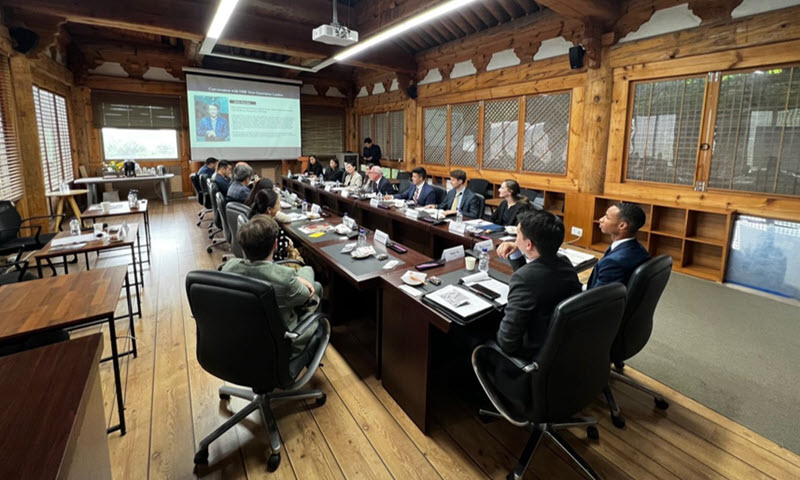
To further explore Korean culture, the NextGen delegation visited Bukchon Village and Gyeongbokgung Palace, where they saw the beauty of traditional Korean architecture, hanok. A tour of the War Memorial of Korea allowed delegates to learn about the legacy of the Korean War and South Korea’s modern history. They also had an opportunity to attend a baseball game and experience the country’s vibrant sports culture.
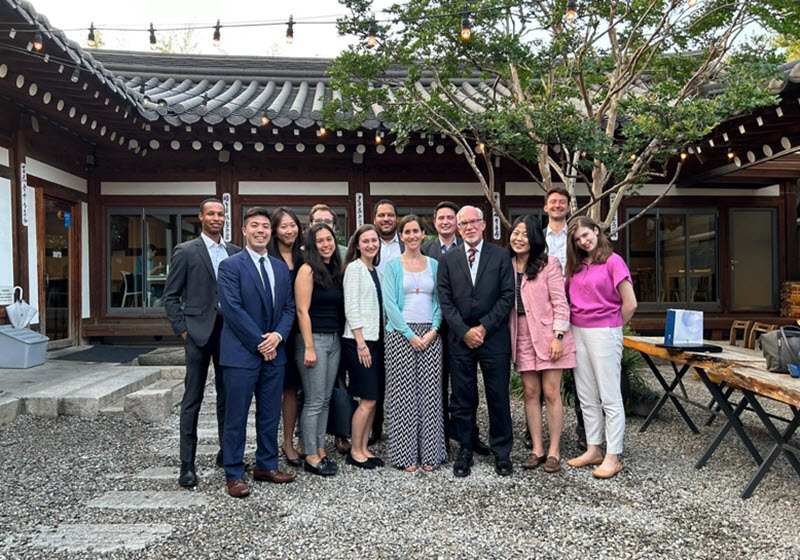
DELEGATION
Participants’ titles and institutional affiliations as of the time of the delegation.
Bryce Barros
China Policy & Strategy Analyst, HII Mission Technologies

Bryce Barros is a China Policy and Strategy Analyst with HII Mission Technologies, supporting the Defense Innovation Unit’s Global Partnerships and Policy Planning Teams. He previously served as a China affairs analyst at the German Marshall Fund. Before that, he was an analyst at Kharon, researching sanctioned actors and related commercial activities tied to strategic trade controls, supply chains, and human rights abuses in the Indo-Pacific. He also interned at the Long Term Strategy Group, researching Sino-U.S. strategic competition, and at the China-Britain Business Council, researching Chinese market entry for UK and EU companies. Mr. Barros is a National Committee on U.S.-China Relations member, Truman National Security Project Fellow, and Aspen Security Forum Scholar. He is also an honorary graduate of the Republic of China (Taiwan) Military. He speaks Mandarin Chinese, Japanese, and Portuguese.
Alexis Dale-Huang
Policy Analyst, RAND Corporation
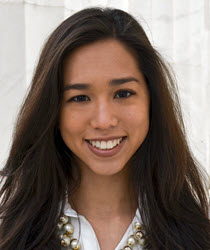
Alexis Dale-Huang is a Policy Analyst at the RAND Corporation. Her research interests include Chinese foreign policy, U.S.-China relations, and the Korean Peninsula. Prior to joining RAND, Ms. Dale-Huang worked as a research assistant for security and foreign affairs at the U.S.-China Economic and Security Review Commission. She previously was a James C. Gaither Junior Fellow at the Carnegie Endowment for International Peace. Ms. Dale-Huang received her BA in international relations and East Asian area studies from the University of Southern California and her MA in Asian studies from Georgetown University’s Edmund A. Walsh School of Foreign Service. She is proficient in Mandarin Chinese.
Khyle Eastin
Senior Intelligence Analyst, CrowdStrike
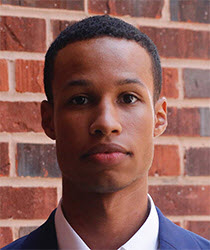
Khyle Eastin is a Senior Intelligence Analyst at CrowdStrike, where he focuses on China and foreign and defense affairs in Asia. He is also a co-founder of the National Association for Black Engagement with Asia (NABEA). His professional and academic interest areas include China-related national security, foreign policy, and technology affairs, with a specific focus on China’s space sector. Prior to these roles, Mr. Eastin served as a Peace Corps volunteer in China from 2016 to 2018. He has also studied in the Middle East (Amman and Jerusalem). He holds an MA in Asian studies from Georgetown University’s School of Foreign Service and a BA in international relations from Pomona College. Mr. Eastin is a Nonresident Fellow at the National Bureau of Asian Research and an Aspen Security Group Rising Leader.
Connor Fairman
Systems Engineer, MITRE Corporation

Connor Fairman is a systems engineer at the MITRE Corporation. He was previously a research associate at the Council on Foreign Relations. His interests lie at the intersection of technology and national security, particularly in the area of U.S.-China technology competition and the role of U.S. allies in strategic competition. He speaks Chinese and Spanish and received undergraduate and graduate degrees in engineering and social science from the University of Pennsylvania.
Lev Nachman
Assistant Professor, National Chengchi University

Lev Nachman is an Assistant Professor in the College of Social Science at National Chengchi University in Taiwan. He was previously the Hou Family Postdoctoral Research Fellow in Taiwan Studies at the Harvard Fairbank Center and holds a PhD in political science from the University of California, Irvine. His research focuses on political participation and social protest in Taiwan, cross-strait relations, and U.S.-Taiwan relations. Dr. Nachman regularly provides commentary on Taiwanese and cross-strait politics and U.S.-Taiwan relations. He is frequently quoted in the New York Times, CNN, Bloomberg, the BBC, and the Guardian and publishes widely in outlets such as Foreign Policy, the Diplomat, and peer-reviewed journals, including Political Research Quarterly and Asian Survey. He is based in Taipei and speaks fluent Mandarin. Dr. Nachman is a Nonresident Fellow at the National Bureau of Asian Research and the Atlantic Council Global China Hub.
Olivia Schieber
Project Manager, Meta

Olivia Schieber is a Project Manager on the Dangerous Organizations and Individuals Team at Meta, where she focuses on violent and extremist actors who seek to leverage online platforms to conduct real-world harm. Previously, she was a senior program manager of the Foreign and Defense Department at the American Enterprise Institute. Additionally, she is a master’s student in Georgetown University’s Security Studies Program and recently completed her thesis on how the diverging Korean language will impact future unification efforts. Ms. Schieber holds a BA in East Asian Studies and International Studies from Johns Hopkins University, where she received the Woodrow Wilson Fellowship to conduct an independently designed research project on the South Korean military. An avid lover of foreign languages, she has studied Mandarin Chinese, Japanese, and Korean.
Katherine Schultz
Cybersecurity Analyst, National Cyber and Information Security Agency of the Czech Republic
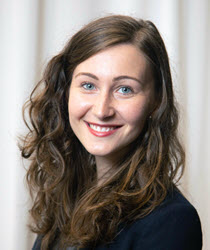
Katherine Schultz is an international relations and cybersecurity researcher focusing on the region of East Asia. She currently serves as a cybersecurity analyst at the National Cyber and Information Security Agency of the Czech Republic. She is also an adjunct fellow at the Global Taiwan Institute (GTI). In her former position as a research associate at GTI, Ms. Schultz focused on the complex triangle of relationships between the United States, Europe, and Taiwan. Her past work has analyzed Central European nations’ relations with Taiwan and transatlantic approach toward China and Taiwan. Her prior professional experience includes internships at a European policy think tank, a UN initiative, and the Czech Embassy in London. Ms. Schultz earned her MA degree at the George Washington University’s Elliott School of International Affairs and her BA at Charles University in Prague. In 2017, she was awarded the Huayu Enrichment Scholarship to study Mandarin Chinese in Taiwan. She is a Czech and English bilingual speaker, is fluent in Mandarin Chinese, and has a passive knowledge of several European languages.
Sean Yu
Chief of Staff, Exovera

Sean Yu is the Chief of Staff at Exovera’s Center for Intelligence Research and Analysis (CIRA), a privately owned intelligence solutions company based in the Washington, D.C., area. He leads a team of over 50 foreign language-enabled intelligence analysts who produce open-source intelligence products for U.S. and Five Eyes governments and private sector clients. As Chief of Staff, Mr. Yu develops CIRA’s strategy; conducts senior client engagement, product demonstrations, and capability briefings; and leads recruiting efforts. Prior to this role, he was a senior China intelligence analyst at CIRA and lead the development of one of Exovera’s technology products. Mr. Yu is the recipient of various U.S. government scholarships, holds an MA from Georgetown University, is PMP- and AGILE-certified, and has advanced Chinese language skills.
Evans Revere
Senior Advisor, Albright Stonebridge Group
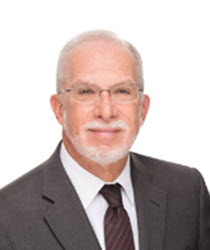
Evans Revere is a Senior Advisor at Albright Stonebridge Group, where he advises clients on entry and growth strategies throughout Asia, with a specific focus on Korea, China, and Japan. Mr. Revere brings decades of experience as an expert on Asia-related matters to his work with clients. During a distinguished career as one of the U.S. Department of State’s top Asia experts, he served as acting assistant secretary of state for East Asian and Pacific affairs and principal deputy assistant secretary, managing U.S. relations with the Asia-Pacific region and leading an organization of 950 American diplomats and 2,500 Foreign Service National employees. During his government career, Mr. Revere won numerous awards for his work throughout Asia and in Washington, D.C.. He was deputy chief of mission and later chargé d’affaires at the U.S. Embassy in Seoul and also served in China, Taiwan, and Japan. Renowned for his expertise on North Korea, he has hundreds of hours of negotiating experience with North Korean officials and frequently participates in official and informal dialogues with Pyongyang’s representatives. Mr. Revere previously served as president and CEO of the Korea Society. His commentary on Asia often appears in leading media outlets in the United States, Asia, and Europe, including ABC, CNBC, CNN, the New York Times, and Reuters. Mr. Revere is a graduate of Princeton University, a U.S. Air Force veteran, and a life member of the Council on Foreign Relations. He is fluent in Chinese, Japanese, and Korean.
Alison Szalwinski
Vice President of Research, The National Bureau of Asian Research

Alison Szalwinski is Vice President of Research at the National Bureau of Asian Research. She provides executive leadership to NBR’s policy research agenda and oversees research teams in Seattle and Washington, D.C. Ms. Szalwinski is the author of numerous articles and reports and co-editor of the Strategic Asia series along with Ashley J. Tellis and Michael Wills. Prior to joining NBR, she spent time at the U.S. Department of State and the Center for Strategic and International Studies. Her research interests include U.S. alliance relationships, U.S.-China relations, and the implications of great-power competition for U.S. alliances in the region. Ms. Szalwinski holds a BA in foreign affairs and history from the University of Virginia and an MA in Asian studies from Georgetown University’s Edmund A. Walsh School of Foreign Service.
Miles Monaco
Project Manager, Political and Security Affairs, The National Bureau of Asian Research
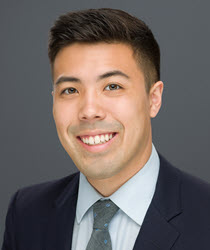
Miles Monaco is a Project Manager with the Political and Security Affairs group at the National Bureau of Asian Research. In this position, he manages projects related to U.S. engagement with allies and partners in the Indo-Pacific, focusing on Northeast Asia and Oceania. Prior to joining NBR, Mr. Monaco was an international affairs analyst for Aflac’s government relations team in Washington, D.C., where he provided analysis on U.S. political and regulatory developments to Aflac executives based in Japan. He also worked for the U.S. Association of Former Members of Congress, organizing congressional delegations to Japan for members of Congress and their staff. Mr. Monaco holds a BA in international studies from American University’s School of International Service, and he also attended South Korea’s Yonsei University.
Julia Oh
Program Advisor, The National Bureau of Asian Research (NBR)
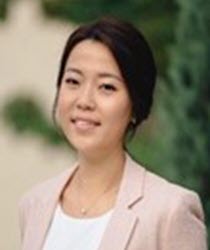
Julia Oh is a Program Advisor at the National Bureau of Asian Research and a Program Manager at the International Republican Institute, Korea. Based in Seoul, she provides guidance on NBR’s Korea programming, business development, and strategic relationship building. She was previously a resident fellow in NBR’s Washington, D.C. office. Prior to joining NBR, Ms. Oh worked for the ROK government in London at the Korea Trade-Investment Promotion Agency. She interned for one year in a separate research role for the Korea Economic Institute of America in Washington, D.C., and the United Nations Office for Disarmament Affairs in New York. While completing her MA, she contributed to the Centre for Science and Security Studies in London. Ms. Oh holds a BA in communications from the University of Delaware and an MA in international relations from the Department of War Studies at the King’s College London, where her dissertation focused on the role of North Korea’s nuclear weapons program in domestic propaganda.
Eunwoo Joo
Assistant Coordinator, The National Bureau of Asian Research
Eunwoo Joo is an Assistant Coordinator at the National Bureau of Asian Research, where she provides logistic support and assists with program coordination. She was previously a Korea Foundation Research Fellow at NBR. Her academic interests lie at the intersection of technology and international security, with a specific focus on the U.S.-Sino strategic competition and the transformative effects of emerging technologies on conventional warfare. Currently, she is pursuing a PhD in political science at George Washington University in Washington, D.C.. Ms. Joo holds bachelor’s and master’s degrees in political science and international relations from Ewha Womans University in South Korea.



